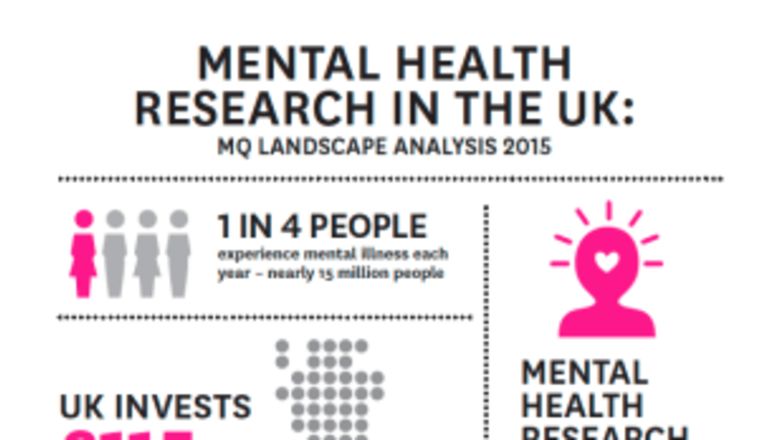The impact of mental health problems on individuals, families, and communities is huge. With 1 in 4 of us affected at some point each year, the issue will touch us all.
Mental health is talked about more than ever before, and is emerging as an important national political issue. We’re also starting to see positive changes in public attitudes, thanks to impressive national campaigns like Time to Change.
However, despite this increased dialogue, we still don’t know enough about mental health – in particular, how we can improve diagnosis, treatment and prevention. Figures indicate that three-quarters of people with mental illness are currently not in treatment, so it’s clear this is an area that matters.
How much is the UK investing in research to address these issues? The short answer: not enough.
We carried out a review of the current UK mental health research landscape, including a major six-year analysis of grant activity. Our review found that roughly £115 million is spent per year on mental health research. That sounds like a lot of money, but actually it equates to only around £8 per person affected by mental illness. To put that in context, in the field of cancer research, one of the most vibrant fields in all of healthcare, the average spend on research per cancer patient is closer to £178.
When you look at what is spent on individual conditions, the situation is even more stark – people affected by the two most common mental disorders, depression and anxiety, have approximately £1.55 and just 21p per person spent researching their respective conditions.
It’s just not enough, and we aim to change this for the better. But first we have to understand why this is. Our report highlights a range of factors contributing to these low levels of funding, not least the issue of stigma. But there’s one fundamental issue – the lack of charitable funding in the sector – and that was the reason that MQ was set up.
In the UK, for every £1 spent by the Government on mental health research, the general public donates just 0.3p. That’s less than half a penny. Compare that to the equivalent charitable donation for cancer: £2.75.
We know that major advances across healthcare are driven by strong charity communities, especially here in the UK. The sustained streams of charitable funding have been instrumental in delivering improvements in patient care and disease prevention in areas like cancer and heart disease.
That’s not to say there aren’t mental health charities doing extremely valuable work. There is a strong and effective charity sector providing vital advocacy and support, addressing public attitudes, and influencing policy and healthcare practice. It’s all essential work, but the truth is, when it comes to scientific research to learn more about what causes mental illness, and how best to diagnose, treat and prevent it, everyone thinks someone else has got it covered.
Until now, there has never been a major fundraising charity dedicated solely to mental health research. The result is that the general public have never been asked en masse to support research advances in mental health. We want to change that.
MQ was set up to fill this gap and begin to secure unprecedented levels of research investment from the general public.
To do this, we are working to demonstrate the value and opportunity that research can bring. We need to communicate that research can be used to raise awareness of conditions, to speed up access to new treatments or interventions, and offer ways toprevent the impact of mental illness on future generations.
Mapping the landscape is an important first step in telling this story. By getting a picture of the state we are in, we can better understand where the gaps are and set out the case for improvements.
At MQ’s recent Annual Science Meeting, Professor Shitij Kapur pointed out that we are at a particularly important ‘turning point’ in the sciences fundamental to mental health. Highlighting the world-leading research infrastructure in the United Kingdom, he echoed Bill Gates in stating, “change can happen”.
At MQ, we’re keeping these messages front and centre in our work as we begin this important journey. We hope you’ll join us.



